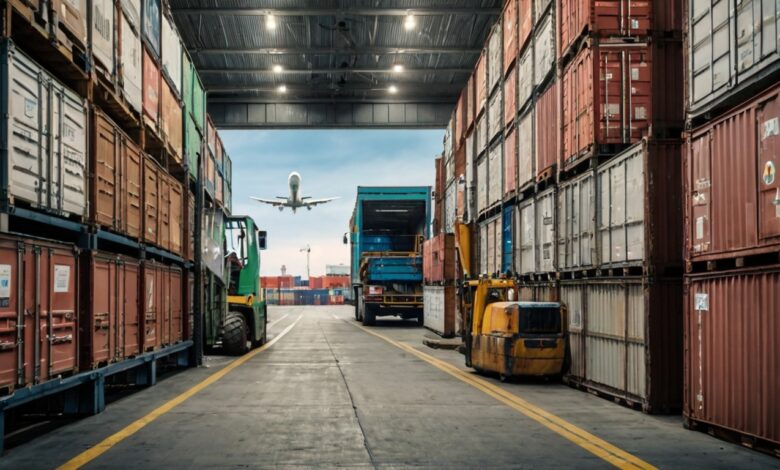Logistics 101: What Does a Freight Forwarder Actually Do?

If your business deals with international shipping, you’ve probably come across the term freight forwarder. But what exactly does a freight forwarder do? Are they just a transportation provider, or do they play a bigger role in your supply chain?
In this blog, we break down the functions, responsibilities, and value a freight forwarder brings to global trade and logistics. Whether you’re a small exporter or a large manufacturer, understanding their role can help you improve efficiency, reduce risks, and enhance delivery reliability.
What Is a Freight Forwarder?
A freight forwarder is a company or agent that organizes the movement of goods from the point of origin to the final destination on behalf of a shipper. They don’t physically move the goods themselves—instead, they act as intermediaries between shippers and various transportation services, including ocean carriers, air cargo providers, and trucking companies.
Think of them as travel agents for cargo—they handle the logistics so you don’t have to.
Key Responsibilities of a Freight Forwarder
Here’s a look at the main duties a freight forwarder typically performs:
1. Transportation Planning and Coordination
Freight forwarders determine the most efficient, cost-effective way to transport your goods. They evaluate various shipping methods (air, sea, rail, or road), route options, and carrier availability. Their goal is to minimize cost while ensuring timely delivery.
They book cargo space, consolidate shipments if necessary, and arrange pickup and delivery schedules based on your business timeline.
2. Documentation Handling
International shipping involves complex paperwork. Freight forwarders prepare and manage essential documents such as:
- Bill of Lading (BOL)
- Commercial Invoice
- Packing List
- Certificate of Origin
- Export and Import Licenses
- Letter of Credit (if applicable)
Correct documentation is vital for customs clearance and smooth cargo movement. Errors or omissions can result in costly delays or fines.
3. Customs Clearance
Navigating customs regulations is one of the most critical roles of a freight forwarder. They ensure your goods comply with the laws of both the origin and destination countries. This includes:
- Classification of goods
- Payment of duties and taxes
- Filing customs declarations
- Resolving customs holds or inspections
Freight forwarders may work with licensed customs brokers or have in-house expertise to expedite clearance procedures.
4. Cargo Insurance Arrangement
Freight forwarders can help you obtain cargo insurance to protect your shipment against loss, damage, or theft during transit. While not mandatory, insurance provides peace of mind—especially when shipping high-value or fragile goods.
They’ll advise you on the best coverage type based on the mode of transport and risk level involved.
5. Warehousing and Storage Solutions
Many freight forwarders offer warehousing options at key ports or inland locations. These facilities serve as temporary storage for shipments awaiting consolidation, inspection, or onward delivery. Additional services may include:
- Inventory management
- Order fulfillment
- Cross-docking
- Packing and labeling
Warehousing capabilities make freight forwarders more flexible in handling large volumes or unexpected shipping delays.
6. Consolidation Services
When shipping smaller cargo loads, freight forwarders may consolidate your goods with those of other clients to form a full container load (FCL). This method—called less than container load (LCL) shipping—saves costs and ensures better space utilization.
Consolidation is especially helpful for small businesses and startups that can’t fill an entire container.
7. Tracking and Communication
Modern freight forwarders offer real-time tracking systems that give you visibility into your shipment’s location, estimated arrival time, and delay notifications. These systems are integrated with customer service teams who keep you updated and resolve issues quickly.
Good freight forwarders provide proactive communication throughout the journey of your shipment.
Who Uses Freight Forwarders?
Freight forwarders serve a wide range of clients, including:
- Manufacturers
- Wholesalers and Distributors
- E-commerce retailers
- Exporters and Importers
- Government and defense contractors
Basically, any business that moves goods across borders can benefit from the services of a freight forwarding company.
Why Not Just Use a Carrier Directly?
While large carriers like Maersk or FedEx offer direct shipping services, they typically do not assist with all the logistics elements—especially customs clearance, documentation, and insurance. Freight forwarders provide a full-service approach that helps businesses:
- Save time
- Avoid costly mistakes
- Navigate regulations
- Access better freight rates due to volume discounts
They are especially valuable for businesses with limited logistics experience or smaller teams.
The Difference Between Freight Forwarders and Customs Brokers
It’s common to confuse freight forwarders with customs brokers. While some freight forwarders offer customs brokerage services, the roles are distinct:
- Freight forwarders manage the entire shipping process, from planning to delivery.
- Customs brokers focus solely on ensuring goods pass legally through customs.
Many forwarders partner with licensed customs brokers or employ them directly.
How to Choose the Right Freight Forwarder
Here are some qualities to look for:
- Experience with your industry and type of cargo
- Strong global network and partnerships
- Transparent pricing and cost estimates
- Good customer reviews and case studies
- Technology and tracking systems
- Knowledge of import/export regulations in your target regions
If you’re looking to ship through a major Indian port, experienced freight forwarders in Mumbai can offer tailored solutions due to their proximity to Nhava Sheva and Mumbai Port, two of the busiest ports in the country.
Conclusion
Freight forwarders are critical players in global trade. They don’t just move cargo—they manage the entire shipping process, helping your business stay compliant, cost-effective, and on schedule. With the right freight forwarder, you can reduce complexity, avoid pitfalls, and keep your supply chain running smoothly.
Whether you’re new to international trade or looking to streamline your existing logistics, partnering with a reliable freight forwarding company can be a game-changer for your business success.
Follow for more!


